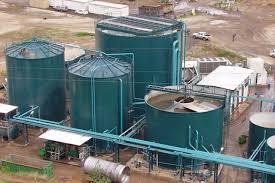Organic waste is biodegradable waste generated from plants or animals waste. The decomposition of organic waste is critical. There are several methods for treating organic waste, but first, it is necessary to understand what it all consists of. Any type of food waste, leftover food, manure, animal waste, wood waste, and vegetable and fruit waste is included in organic waste. This waste will degrade over time, but it will emit methane, which will harm the environment indirectly by generating heat. For the treatment of this organic waste, WOG employs anaerobic digester. WOG is already in the market for the treatment of water or wastewater treatment for industries. The greatest advantage of anaerobic digestion is that it reduces greenhouse gas emissions by extracting methane from wastewater.
The experts will make sure that it will not waste water and that the technique we are using will not harm the environment. The techniques we are using consist of fewer chemicals & use less energy. After advanced manufacturing wastewater treatment removes the most dangerous contaminants, and water is purified and made suitable for reuse.
Anaerobic Digestion Technique for Treating Organic Waste
Anaerobic digester is a bacterial wastewater treatment technique that removes harmful chemicals from the waste. This anaerobic digestion occurs inside a vessel and uses all bacteria to break down waste materials. Depending on the industry’s needs, all vessels are different in shape or size. It emits a variety of gases, liquids, and solid waste, the majority of which is methane. Additionally, this gas will be use to produce heat, electricity, fuel for vehicles, or renewable natural gas.
This technique is using various types of bacteria or microorganisms in the absence of oxygen for substance breakdown. It includes acetic acid-producing bacteria, acetogenic bacteria, acetobacter, methanogenic bacteria, and methane-producing archaea.

Anaerobic Digester
What Is the Difference Between Anaerobic and Aerobic Water Treatment?
There are two types of biological wastewater treatment systems: anaerobic digester water treatment and aerobic digester systems.
- The first & main difference between the two wastewater treatments is that anaerobic treatment takes place in the absence of oxygen, whereas aerobic digestion takes place in the presence of oxygen.
- Anaerobic digester systems are less expensive as compared to aerobic digester systems as their operating costs are much higher.
- Anaerobic digesters techniques use microorganisms to break down and eliminate organic pollutants from wastewater while aerobic wastewater treatment systems use oxygen-controlled bacteria and protozoa for the purification of wastewater.
- Anaerobic digester systems use biomass sludge to keep away from air as it contains oxygen while aerobic treatment systems are less energy efficient due to the demand for circulating wastewater aerobics systems.
Advantages Of Anaerobic Digestion For Bacteria Decomposition
- This will not employ harmful chemicals; it will aid in the conservation of our agricultural land.
- Improve soil health by converting the nutrients in manure into a form that plants can use.
- We are using the energy created by gas for generating power in the neighbourhood areas. This can assist the local utility in meeting rising energy demand through the use of locally sourced renewable energy.
- The ecological balance will be preserved by turning leftover food into manure, which will then be used to grow crops.
- This will help to reduce the greenhouse effect.
- This will reduce the overall cost of the wastewater treatment system.
Anaerobic Digestion Has A Number Of Financial Advantages
- All industries using anaerobic digestion technology will automatically reduce energy costs.
- After anaerobic digestion, we produce biogas, which is utilised to fuel a variety of industries and provide energy.
- The generated electricity can also be used for a variety of purposes in industry.
- Another way to use fuel and energy is for industries to supply it to other industries and earn money from it.
Wastewater Treatment Is Divided Into Three Stages
The wastewater treatment process is divided into three stages: primary, secondary, and tertiary water treatment. More advanced treatment, known as quaternary water treatment, is required in some applications. In most of the cases only three stages are required, as tertiary & quaternary is an expensive technique so we will use them only in extreme requirement cases.
WOG Group Provides The Best Solutions By Utilising Cutting-Edge Technology
Water is used in nearly every manufacturing process. Industrial Wastewater Treatment Solutions are used in a variety of industries. WOG Group works with both public and private sector organizations. Eventually, we have implemented various treatment plants for industries as well as domestic areas. For Industrial Water Treatment facilities, we use cutting-edge technologies. We use less energy in our Wastewater Treatment for Industrial Processes. Businesses are changing their production methods in order to reduce wastewater, which has resulted in proper production research procedures. WOG Innovation offers the most efficient solutions, utilizing fewer chemicals in the system. Finally, WOG Group solutions may be advantageous to businesses that produce wastewater. As a supplier, we offer the option of water recycling and efficient use.https://www.ziparticle.com/


